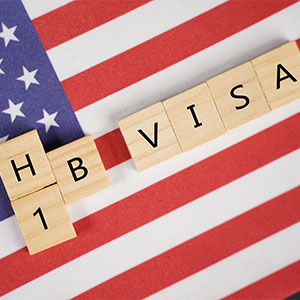
If you are a citizen of a foreign country, you will need a visa to enter the United States. There are two broad categories that visas fall under: Nonimmigrant visa Immigrant visa If you want to temporarily work in the United States, you will need a nonimmigrant visa. You are here to work rather than to move to this country. There are different employment groups and types of visas. Exchange Visa – This is a “J” visa. You will see these associated with schools. University professors may teach at a school for a semester. And they will be traveling to a foreign country to do so. Because they will be working and getting paid, they would be applying for this visa. Temporary Employment – This is your visa for temporary employment B Visas – Temporary Business Visa H-1B – Speciality Occupations (i.d., a Bachelor’s Degree) H-2A – Seasonal Agricultural Workers H-2B – Seasonal/Non-Agricultural H-3 – Training and Education L Visa – Internal Company Transfers O Visa – People With Extraordinary Ability (this pertains to people…Read More

To apply for a marriage-based visa, you are not required to have an attorney. However, an attorney can be helpful, and there are a few important reasons why you should consider hiring one. Exploring Your Options An experienced immigration attorney can help you explore your visa options and determine which path is right for you. Maybe a marriage-based visa isn’t the best course of action. Maybe, if you aren’t married yet, you should try for a fiancé visa. You can discuss your needs with the attorney, and they can help you make the right decision. Handling The Paperwork As with any visa application, there is a great deal of paperwork involved in a marriage-based visa application. The forms can be confusing, and having an attorney to make sure they are accurately and clearly completed can take some of the pressure off of you. Let the attorney handle the paperwork, and you can sit back and make preparations for your future. Presenting The Necessary Evidence When…Read More
The difference between these two terms is simple: inadmissible is used when someone is denied entry into the United States; removable refers to someone who is already in the country. They may fall into one of these categories: Living in the U.S. legally (they possess a nonimmigrant visa or a green card) They are undocumented (no green card or nonimmigrant visa) and are here illegally Why are these two (2) terms important for you to know? It’s because of what they have in common. Regardless of whether you are inadmissible or removable, you will not be allowed to live in the United States. Inadmissible This applies when you are trying to become a legal permanent resident (a green card holder). It MAY apply to legal permanent residents who reenter the US under specific circumstances. The grounds for inadmissibility for people who are applying for a green card can be broken down into the following categories: Criminal Health Security Someone Dependent on the Government (A Public Charge) Having Entered the…Read More

The Difference Between Removable And Inadmissible Immigration The difference between these two terms is simple: inadmissible is used when someone is denied entry into the United States; removable refers to someone who is already in the country. They may fall into one of these categories: Living in the U.S. legally (they possess a nonimmigrant visa or a green card) They are undocumented (no green card or nonimmigrant visa) and are here illegally Why are these two terms important for you to know? It’s because of what they have in common. Regardless of whether you are inadmissible or removable, you will not be allowed to live in the United States. Inadmissible This applies when you are trying to become a legal permanent resident (a green card holder). It MAY apply to legal permanent residents who reenter the US under specific circumstances. The grounds for inadmissibility for people who are applying for a green card can be broken down into the following categories: Criminal Health Security Someone Dependent on the Government…Read More
If you are a United States citizen and your fiancé lives overseas, you have an important decision to make. Should you bring your fiancé over to the U.S., or should you marry them overseas and then bring them over as your spouse? Factors such as timing, your personal preference as to where to hold the wedding, and expense can all play a part in your decision. Fiance Visa A fiancé visa, also known as a K-1 visa, is issued to a foreign national who is engaged and intends to marry a U.S. citizen. Before filing for a fiancé visa, a couple must show that they have seen each other in person within the last two (2) years. The foreign partner must marry the U.S. citizen within ninety (90) days of being admitted to the United States. The U.S. citizen partner must meet the income level of 100% of the federal poverty line. You must be able to establish that you have concrete wedding plans and…Read More

Hiring an immigration attorney is a personal choice. You’re not required to have an attorney, and there are a number of different attorneys out there. Serving Immigrants is uniquely suited to help you with your immigration needs for a number of important reasons. Experience The team at Serving Immigrants has years of experience handling a variety of immigration issues. They know the process and how to handle each step. Immigration processes can be complex, so it is important to have someone who has been through it multiple times. Immigration petitions often involve mountains of paperwork and strict requirements that must be met. The team at Serving Immigrants knows how to work through the paperwork and help you collect the evidence you need for success. Focused Practice Some law firms practice immigration law in addition to other types of law such as personal injury or family law. At Serving Immigrants, immigration law is the sole focus of the practice. This allows the team to hone their…Read More

Under United States immigration law, a limited number of family-based immigrant visas are awarded to foreign nationals every year. Family immigration is the primary basis for immigration to the United States. It accounts for approximately 65% of legal immigration. Eligibility For A Family Visa There are two groups who are eligible for family visas: Immediate Relatives—includes 1) spouses of U.S. citizens; 2) children of U.S. citizens who are under the age of 21; 3) orphans adopted abroad; 4) orphans to be adopted in the U.S. by U.S. citizens, and 4) parents of U.S. citizens who are over 21. Family Preference Categories—includes 1) unmarried sons and daughters of U.S. citizens and their children; 2) spouses, minor children, and unmarried sons and daughters over 21 of Legal Permanent Residents; 3) married sons and daughters of U.S. citizens and their spouses and minor children; 4) brothers and sisters of U.S. citizens and their spouses and minor children. U.S. citizens and legal permanent residents cannot sponsor other relatives such…Read More
Learn How To Prepare Your Immigration Legal Defense Being arrested or detained can be an overwhelming, stressful, and significant event in your life. Though the subject of being arrested by Immigration and Customs Enforcement (ICE) may be uncomfortable to think about, you should still understand your rights and know how to prepare your immigration legal defente. So if you are arrested or detained, you can rely on exercising the rights that you know you have. Remain Silent You do have the right to remain silent. And this can be surprisingly difficult to do. The reason being is that you will likely have the desire to explain your way out of the situation you are in. If you think you’ve been detained mistakenly, you might wish to express this. Should you not have a valid explanation for why you were detained, do not lie or pass off fake documents. Focus on remaining silent and expressing that you would like to remain silent. Think of this: instead…Read More

During the COVID-19 pandemic, the Trump administration put a ban on certain work visas. Trump had frozen new green cards during the pandemic, arguing that the clampdown was important to safeguard the United States economy, protect jobs, and for public health reasons. Trump also halted temporary work visas for skilled workers, managers, and au pairs, including H-1B, H-2B, H-4, L-1, and J categories. Revoking The Freeze In February 2021, President Biden revoked the freeze on many visas and green cards, stating that the freeze was not in the best interests of the United States. Biden also noted that the freeze hurt industries and families and noted that it prevented qualified non-U.S. residents from entering the country. While Biden did not take steps to reopen some temporary work visas, the freeze is set to expire on March 31, 2021, and there is no indication that Biden intends to take further action. The visa ban has contributed to a backlog of over 400,000 family-based visa applications alone.…Read More

Being arrested or detained can be an overwhelming, stressful, and significant event in your life. Though the subject of being arrested by Immigration and Customs Enforcement (ICE) may be uncomfortable to think about, you should still understand your rights. So if you are arrested or detained, you can rely on exercising the rights that you know you have. Remain Silent You do have the right to remain silent. And this can be surprisingly difficult to do. The reason being is that you will likely have the desire to explain your way out of the situation you are in. If you think you’ve been detained mistakenly, you might wish to express this. Should you not have a valid explanation for why you were detained, do not lie or pass off fake documents. Focus on remaining silent and expressing that you would like to remain silent. Think of this: instead of saying something, ask for things. For example, ask if you are free to leave. Ask to…Read More